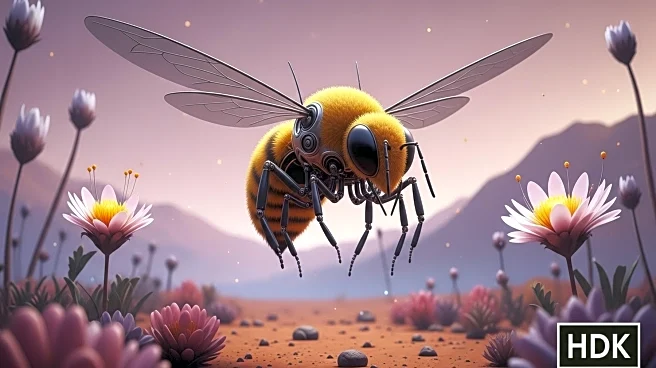What's Happening?
Researchers at the Massachusetts Institute of Technology (MIT) are developing a bee-like robot designed to mimic the flight maneuvers of bumblebees. This robot, weighing less than a paperclip, can flap its wings up to 400 times per second and achieve speeds of two meters per second. The project, led by Yi-Hsuan 'Nemo' Hsiao, a PhD student, aims to use these robots for artificial pollination, potentially on Mars. The robots could be beneficial in environments where natural insects cannot survive, such as warehouse farms with ultraviolet lighting. The team is also working on a grasshopper-like robot capable of hopping and navigating various terrains. These developments are part of a broader trend in robotics, where researchers draw inspiration from nature to enhance robotic capabilities.
Why It's Important?
The development of these insect-inspired robots could revolutionize agricultural practices, especially in environments unsuitable for traditional pollinators. This technology holds promise for future space missions, where pollination on Mars could become a reality. Additionally, these robots could be used in search and rescue operations, exploring confined spaces like pipelines or turbine engines. The ability to mimic natural insect movements offers a significant advantage in creating efficient and adaptable robots. This innovation could lead to advancements in robotics, impacting industries such as agriculture, space exploration, and emergency response.
What's Next?
The MIT team plans to integrate sensors and batteries into the robots to enable autonomous operation. Currently, the robots rely on external power sources, but the goal is to develop self-sufficient machines. The researchers estimate that fully autonomous deployment could be achieved in 20 to 30 years. Continued study of insect motion and behavior will inform future developments, potentially leading to breakthroughs in robotic autonomy and efficiency.
Beyond the Headlines
The ethical implications of replacing natural pollinators with robots could spark debates about biodiversity and ecosystem balance. Additionally, the long-term impact of deploying robots in agriculture and space exploration may raise questions about sustainability and environmental responsibility. As technology advances, the integration of robotics into natural processes will require careful consideration of ecological and ethical factors.









